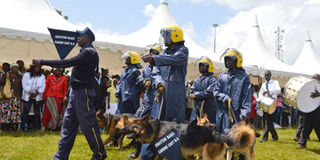Major reforms loom for private security firms

Security guards march during a past Jamuhuri Day celebrations at Ndumberi Stadium in Kiambu County. PHOTO | ERIC WAINAINA | NATION MEDIA GROUP
What you need to know:
- The companies are required to set in motion programmes that would guarantee full compliance within six months.
- Bringing in trained private security personnel is meant to boost rescue and recovery operations during such incidents or disasters.
- The regulations demand that wages and allowances be paid in line with the provision of the Labour Institutions Act.
Major reforms loom in the country’s private security sector after Interior Cabinet Secretary Fred Matiang’i gazetted new regulations touching on the operations of firms licensed to offer services in the industry.
The minister spells out a raft of requirements that the firms have to abide by as they provide services which include general guard duties at residential neighbourhoods, business premises and other key installations, transportation of cash and other valuables and protection of dignitaries.
The companies are required to set in motion programmes that would guarantee full compliance within six months.
The regulations are contained in Legal Notice Number 108 of the Kenya Gazette Special Issue of July 5.
LICENSING
The Private Security (General) Regulations, 2019 touch on virtually all aspects of the firms’ operations and duties ranging from recruitment of staff, pay, training and licensing to handling of diverse equipment, personal safety, among others.
But they also include new aspects and responsibilities some of which will henceforth see private security personnel enlisted by security agencies such as the National Police Service to take part mainly in maintenance of law and order and prevention or mitigation of a national disaster.
Says the regulations: “With the approval of the National Security Council … the Inspector-General of the National Police Service or the Cabinet Secretary may in accordance with Section 45 of the Private Security Regulations Act, 2016 require a private security provider to co-operate for purposes of maintenance of law and order; preventing or mitigating a national disaster; incident planning; sharing security information and sharing expertise and training.”
Initially, such duties were the preserve of the police and armed forces, with the National Youth Service on standby. Relief agencies such as the Kenya Red Cross and St John’s Ambulance also played key roles in such instances.
RECOVERY OPERATIONS
Bringing in trained private security personnel is meant to boost rescue and recovery operations during such incidents or disasters.
There are nearly 2000 registered private security firms in the country out of which 500 actively offer guard duty, according to the Private Security Regulatory Authority (PSRA).
A key feature of the regulations is that the security firms are required to streamline their hiring procedures to ensure they enlist qualified staff.
The firms have to carry out thorough vetting to establish whether a prospective employee has received security training, employment history, character, residence and any other relevant information.
And in order to streamline pay for the security guards, believed to be some of the lowest in the job market, the regulations state that salaries and allowances for the security guards would henceforth be pegged on benchmarks set out under the Labour Institutions Act.
The regulations demand that wages and allowances be paid in line with the provision of the Labour Institutions Act.
For ease of identification, the guards are required to have uniforms that bear a clear and bold “private security” label and a company patch.
The top back part of the uniform, too, is to be imprinted the word “security” in legible characters.”




